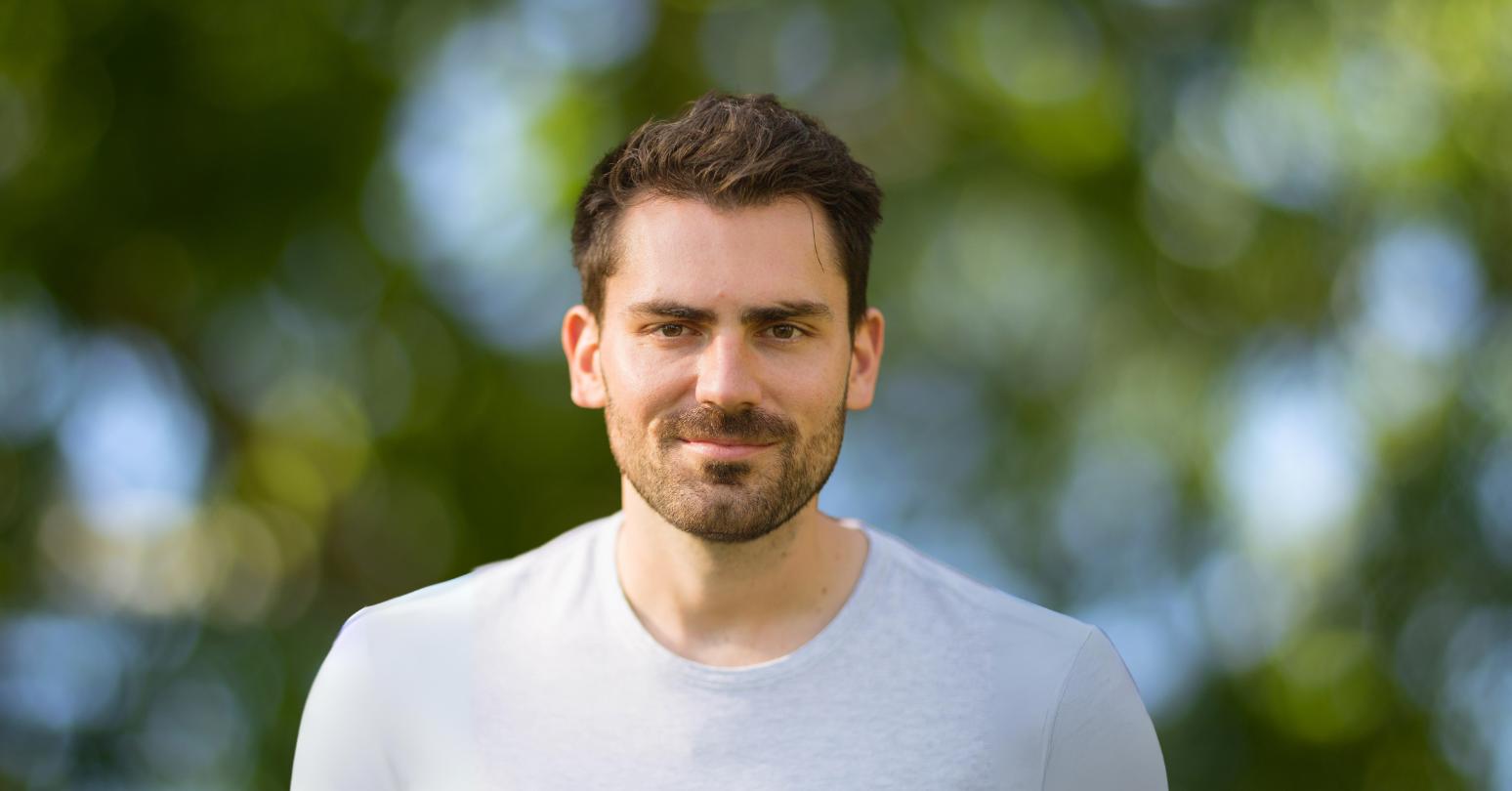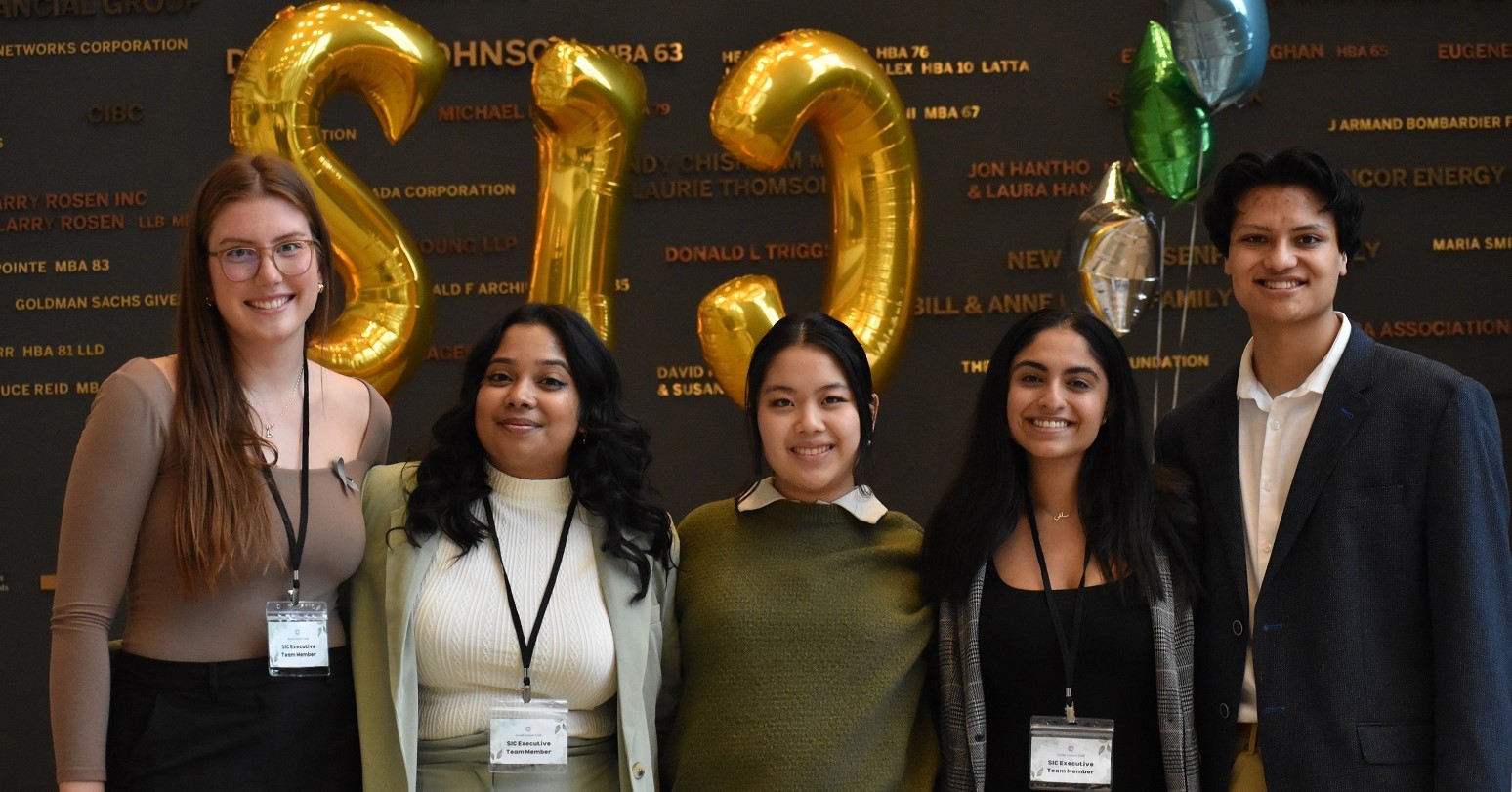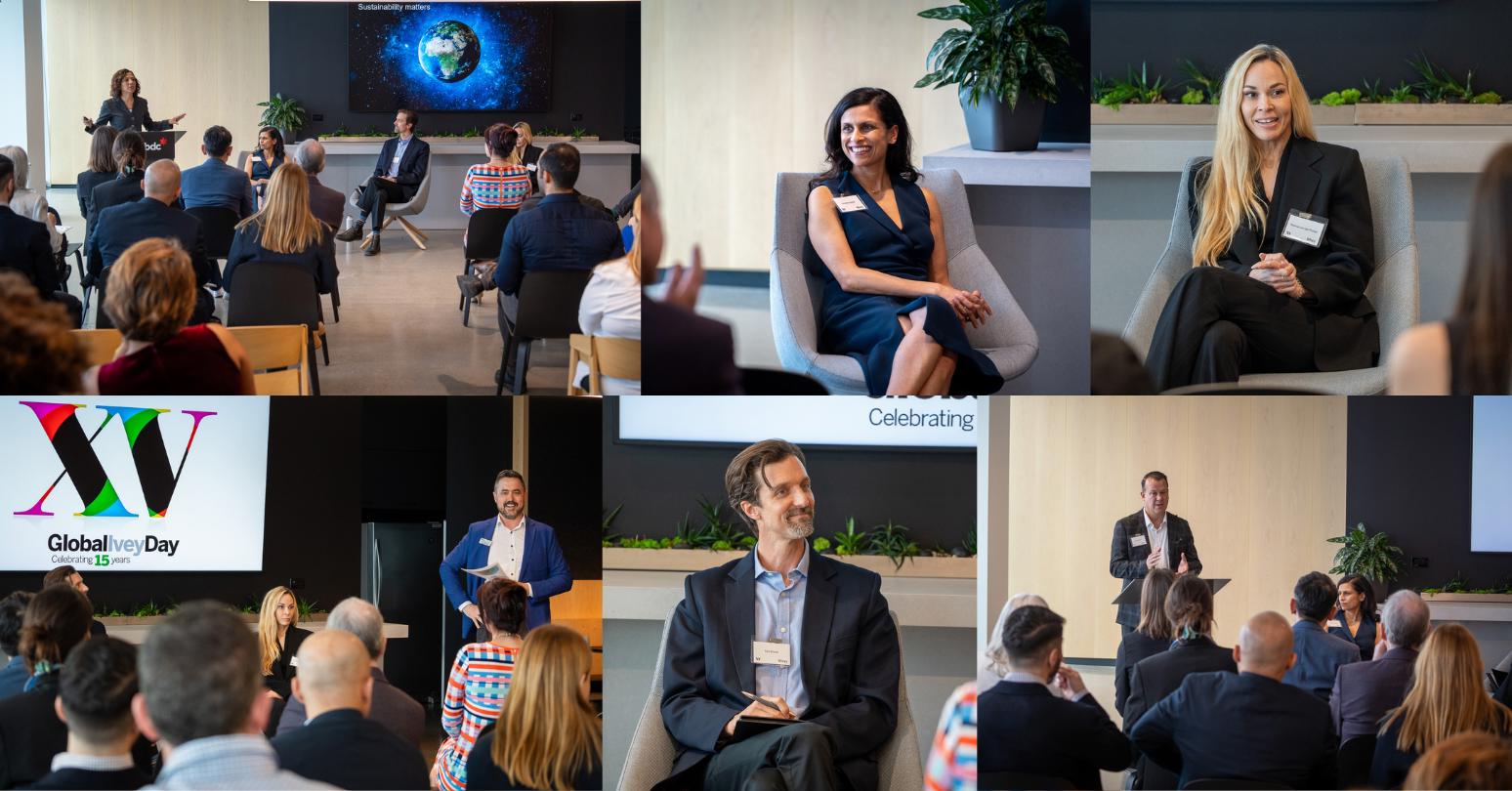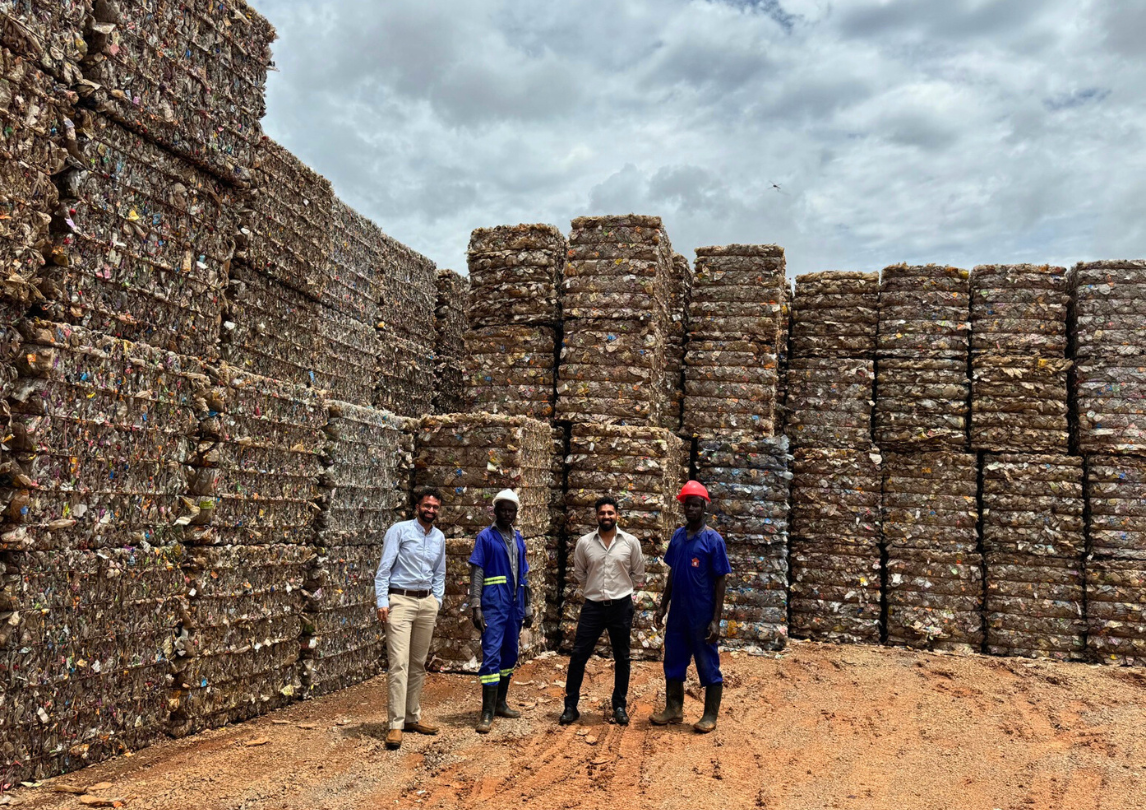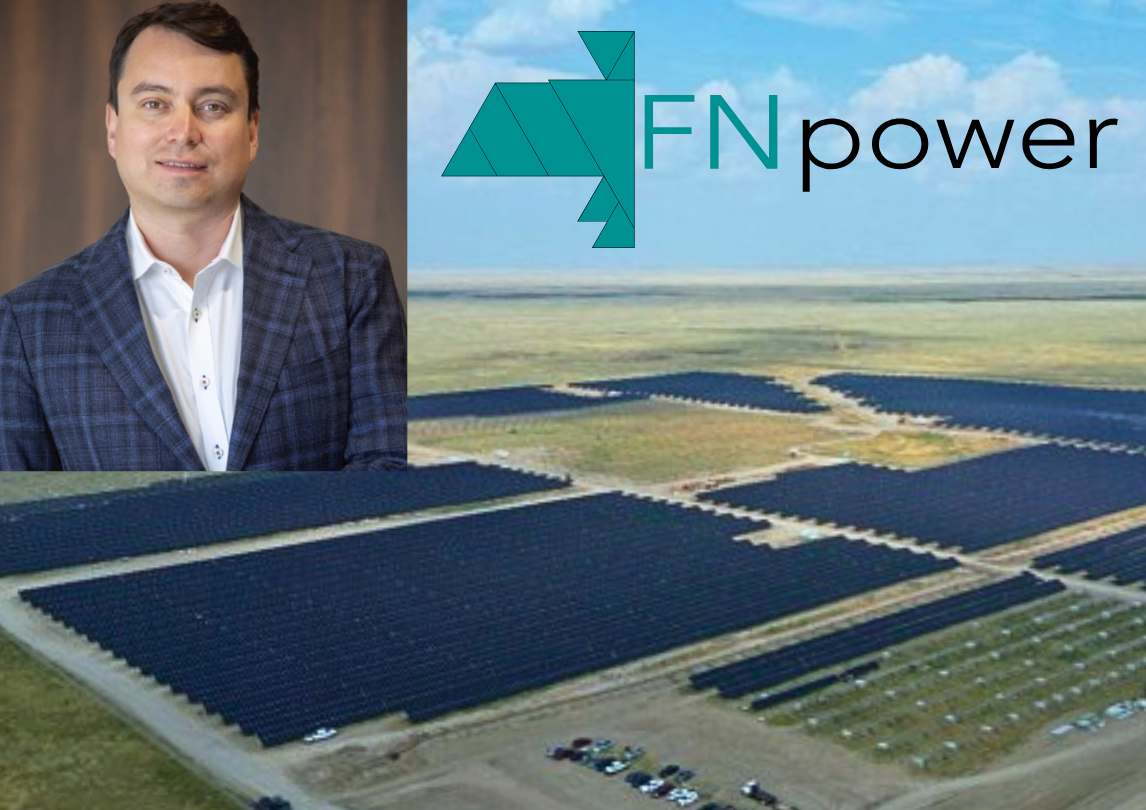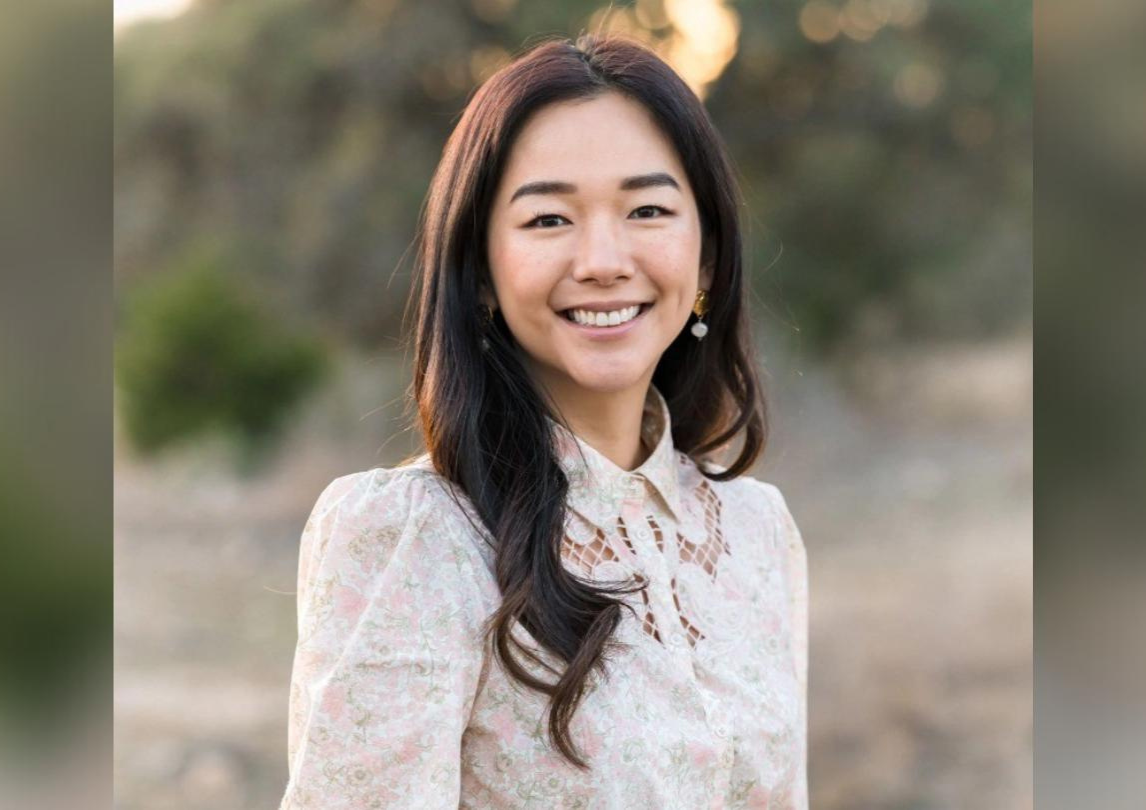Message from the Director
Our impact endures through the lives we uplift
2024 marked a pivotal year for sustainability at Ivey, as we continued to deepen our focus on systems transformation with a clear priority: regenerating Canada’s agri-food system.
Across the globe — and here at home — there remains a troubling trend: many businesses continue to treat critical societal challenges like carbon emissions, biodiversity loss, pollution, and food insecurity as competitive liabilities. Even as urgency grows, there is often little accountability for failing to meet sustainability targets (e.g., Jiang, Kim and Lu).
Against this backdrop, the Ivey Centre for Building Sustainable Value remains steadfast in our belief that a different future is not only possible, but urgent. We envision a world where economic prosperity is not achieved at the expense of societal well-being and ecological resilience, but is instead deeply intertwined with them.
Our task is to make this vision a reality. Through research and outreach, the Centre is strengthening the capacity of change-seekers — leaders and organizations bold enough to take on the challenges others are avoiding. Our work is grounded in the Canadian food system, where we collaborate with farmers, processors, retailers, and investors to build regenerative, thriving communities.
Why center our mission on strengthening communities of change-seekers? Systems thinker Donella Meadows once noted that many systems fail because of malfunctioning hierarchies:
“If a team member is more interested in personal glory than in the team winning, he or she can cause the team to lose. If a body cell breaks free from its hierarchical function and starts multiplying wildly, we call it a cancer. If students think their purpose is to maximize personal grades instead of seeking knowledge, cheating and other counterproductive behaviors break out. If a single corporation bribes the government to favor that corporation, the advantages of the competitive market and the good of the whole society are eroded.”
— Thinking in Systems: A Primer, pp. 84–85
When the goals of individuals or corporations dominate at the expense of broader societal and ecological goals, we see suboptimization — a breakdown of systems and shared value. Regenerative transformation requires strong, cohesive communities working together across the value chain.
This is the work ahead of us.
Through our synergistic Lighthouse Projects — mobilizing farmer communities of practice, catalyzing entrepreneurship through the Regenerator accelerator, and reimagining value chains with change-ready businesses — we are building momentum. These efforts are reinforced by our four impact labs (Sustainable Finance, Net Zero, Circular Economy, and Innovation) and are already making a difference across Ontario and Quebec.
With a strong network of collaborators and a commitment to decentralized action, we are laying the foundation for a regenerative agri-food future that is both ambitious and achievable.
Sincerely,
Jury Gualandris
Faculty Director, Centre for Building Sustainable Value
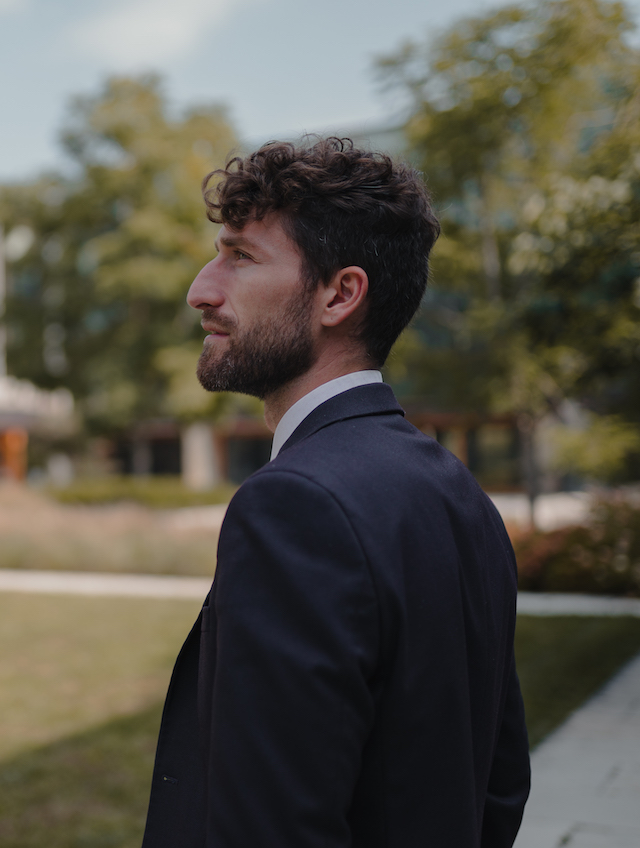
Jury Gualandris
Associate Professor, Operations Management & Sustainability
Sustainability: At the centre of Ivey's new strategy

Building on a nearly 100-year legacy of real-world leadership, Ivey’s new strategy - Ivey Next - includes a clear statement of purpose:
To inspire leaders for a sustainable and prosperous world
Ivey's mission is to develop leaders who think globally, act strategically, and address critical issues facing organizations and society through impactful research and transformative learning experiences. Sustainability is one of three such critical issues: an area in which Ivey has established thought leadership, and is well positioned to drive the agenda with business, government, and other stakeholders for real impact.
The mission of the Centre
Transforming Canada’s Agri-Food System
Ivey Business School’s purpose is to inspire leaders for a sustainable and prosperous world. Within Ivey, the Centre for Building Sustainable Value (BSV) is the School’s centre of excellence in sustainability with a two-decade track record of leadership in research and teaching.
Addressing complex sustainability challenges is more urgent and important than ever, particularly within Canada’s agri-food system. While the system is one of the most economically efficient in the world, the way we produce and consume food is unsustainable. We are generating an enormous amount of greenhouse gas emissions, destroying ecosystems, and wasting vast quantities of resources while millions experience food insecurity.
We need a new food system that delivers universal access to affordable, nutritious food produced within the ecological limits of the planet. Canada can be a leader in this transition but systemic change is required to make that a reality.
The BSV Centre’s mission is to strengthen change-seekers’ capacity to create thriving communities capable of advancing the transition toward a regenerative future. We aim to play a catalytic role in transforming Canada’s agri-food system with a three-pronged strategy: nurturing farmer communities of practice; mobilizing change-ready businesses to foster regenerative value chains; and equipping entrepreneurs with an eco-effective mindset.
These three strategic elements will deliver impactful outcomes by motivating and enabling farmers and businesses across the agri-food system and leveraging Ivey’s key areas of expertise: shifting decision-making principles, strategies, operations, and relationships toward a regenerative future. The key insights from this work can also be applied to support transitions in other sectors of the economy.

CROSS-DISCIPLINARY RESEARCH
CROSS-DISCIPLINARY RESEARCH
CROSS-DISCIPLINARY RESEARCH
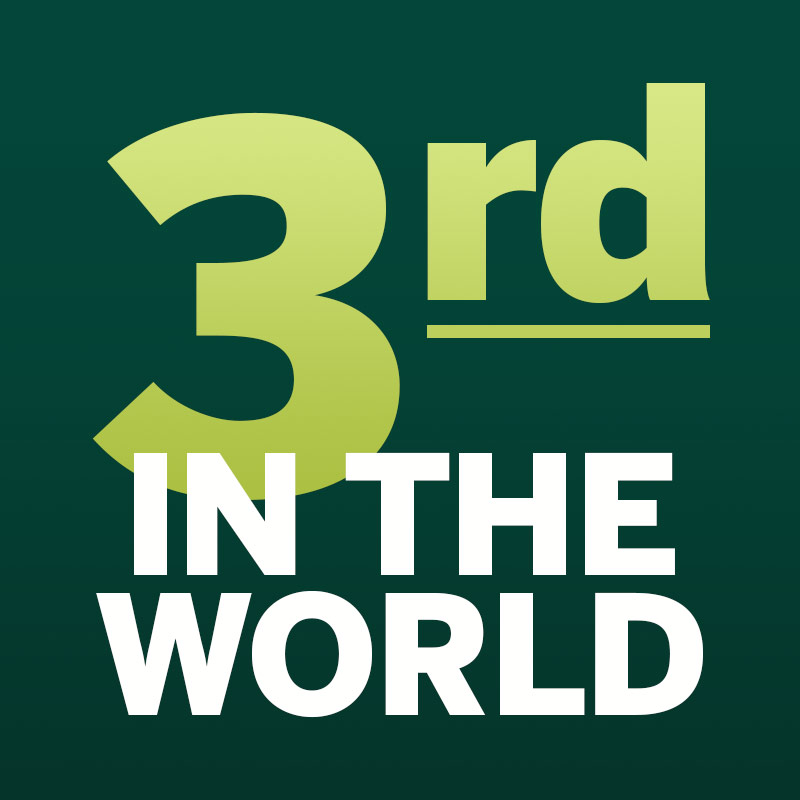
Leading the World in Research
According to a new ranking published in the Financial Times, the Ivey Business School placed third in the world for the degree that its faculty’s research connects with one or multiple of the UN’s Sustainable Development Goals (SDGs).
Featured in the Financial Times’ Responsible Business Education report, the ranking examined the SDG “significance” of hundreds of peer-reviewed papers published in globally prestigious FT50 journals.
Actioning Change
Introducing our new "Lighthouse Initiatives"
The BSV Centre is addressing key barriers to systemic change — poor collaboration, concentrated power, and a narrow efficiency mindset — through our new impact-driven Lighthouse Initiatives.
These initiatives serve as real-world examples of how to build trust across sectors, elevate underrepresented voices, and promote regenerative, inclusive models of success. By connecting diverse actors and testing new approaches, the Centre is helping to unlock the conditions for deeper, more equitable transformation in Canada’s agri-food system.
These initiatives focus on two complementary system entry points: “bottom up” and “top down”. Our two bottom-up initiatives focus on engaging with the agri-food system at the operational, farm level, building on Ivey’s expertise in action research within real system actors and value chains, as well as our widely recognized leadership in entrepreneurship. These initiatives aim to help farmers, agronomists, and entrepreneurs to co-create new ways of farming and co-managing resources, leading to the organic institutionalization of sustainable agriculture:

Collective Action for Sustainable Agriculture Program
Innovative farmers working together
Canada plays a vital role in the agricultural sector. Farming has modernized to make food more affordable and accessible for a growing population, but its strong GDP contribution comes at a significant environmental cost. Accounting for nearly 10% of national greenhouse gas emissions, the agricultural industry must find a way to produce more sustainably while continuing to put affordable food on Canadian tables. Today, agriculture is subject to poor connectivity, increasing market pressures, supply chain consolidation, and competition for resources. These factors coalesce to hinder circularity, diversity, and inclusivity in the industry, and practices that were once common, like land and resource co-management, have diminished among Canadian farmers. Our project aims to stimulate collective action at the county level in consultation with a diverse group of farmers and agronomists, motivated to advance regeneration.

Entrepreneurship and Sustainability Accelerator ("Regenerator") Initiative
Regenerate the future
In collaboration with the Morrissette Institute for Entrepreneurship, the Centre, with the leadership of Oana Branzei, will introduce a dedicated green stream within the Western Accelerator, dedicated to sustainable agri-food and bio-economy start-ups. This green stream "Regenerator" is an impact-driven program aimed at accelerating the growth of high-potential ventures. Through a 16-week intensive program, selected ventures receive hands-on mentorship and educational training from in-house experts and industrial partners. The program is designed to compress years of accumulated knowledge and learning into four months, enabling entrepreneurs to accelerate their ventures' life cycles. These ventures will help promote a just transition to net zero and a regenerative, circular economy through sustainable finance and offer real-time examples of entrepreneurship and innovation aligned with the 2030 agenda and 2050 plans.
These direct interventions will be complemented by two top-down initiatives that engage with the “big picture” of the agri-food system, leveraging Ivey’s expertise in systems thinking to broker critical conversations with influential system stakeholders, especially those operating downstream (processors, retailers) and providing capital (regulators, investors), with the ultimate goal to de-risk the climate transition for farmers:

System Transformation Pathways Initiative
Reimagining value chains for regeneration
The Systems Transformation Pathway Initiative will convene key Canadian agri-food system stakeholders to characterize a shared vision of the future agri-food system and then clarify critical pathways (e.g., technology, sourcing and production paradigms, financial models) and actions that can accelerate transformation towards this ideal future.
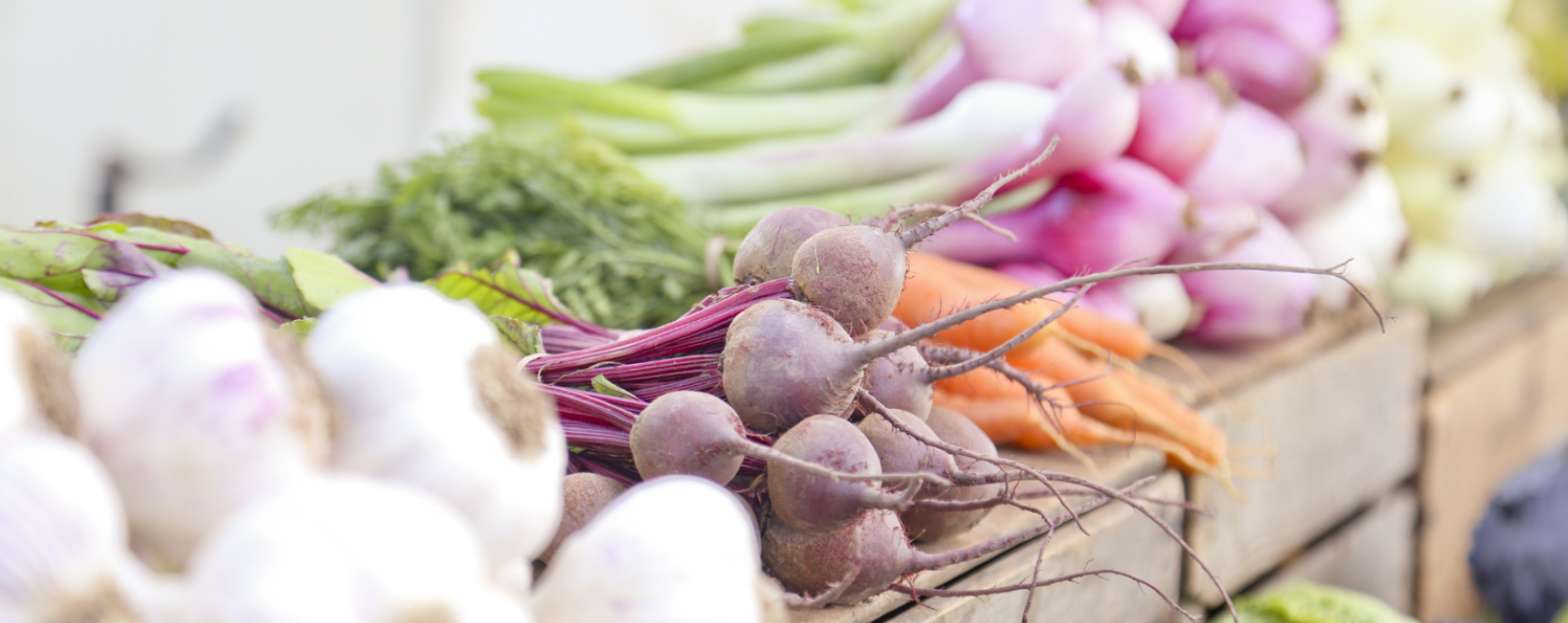
Future of Agri-food Event Series
The Future of Agri-Food Event Series explored the evolving landscape of food systems, bringing together experts from academia, industry, and policy to discuss pressing challenges and emerging opportunities. Each session focused on a critical aspect of agri-food sustainability, from regenerative agriculture to food security and circular food economies.
- Session 1: The Future of Agri-food: Canada's Leadership Opportunity examined shifting consumer expectations, technological innovations, and policy developments shaping the sector. The discussion highlighted how businesses can navigate these changes while advancing sustainability goals.
- Session 2: Regenerative Agriculture: The Role of Finance & the Value Chain explored how circular economy principles can reduce waste and improve resource efficiency across supply chains. Experts shared strategies for integrating circular practices into business models and fostering collaboration across sectors.
- Session 3: Circular Food Economy: Canada's $50 Billion Opportunity addressed key questions on resilience, climate adaptation, and the role of policy in driving sustainable transformation. Panelists explored how agri-food stakeholders can work together to build a more secure and equitable food future.
- Session 4: Challenging the Production Paradigm: Voices of the Farmer focused on the growing demand for alternative proteins and the innovations driving this shift. Experts discussed the economic, environmental, and consumer trends influencing the protein market and what it means for the future of food production.
Impact Labs
The Centre houses four research labs: Circular Economy, Innovation North, Net Zero, and Sustainable Finance
These priorities are necessary to transform systems in Canada and globally, and provide the toolbox for investigating systems and advancing evidence-based solutions. These Labs were established recognizing the importance of transitioning organizations and economy to net-zero GHG emissions and circular models, catalyzing innovation, and new financial instruments as key tools for accelerating these transitions.
Circular Economy Lab
The Circular Economy Lab is working to accelerate system transformation towards a circular economy in Canada by providing insights into how circular supply chains can function and how current supply chains can be transformed. The focus of the research program – how firms can realise waste synergies through opportunity recognition and operational agility – is both addressing a major gap in the circular economy literature and generating important insights for practical action. The program is building a case that harnessing these capabilities of firms will greatly accelerate progress towards circular production systems.
Highlights from 2024 include:
- The release of Climate-Smart Circularity: Guiding Decision-Making Through Data-Informed Standard Protocols, a report produced with CSA Group that examines the environmental impacts of circular practices across three industries. The research emphasizes that the emissions benefits of reuse, recycling, and repurposing depend heavily on how circular pathways are designed - and will inform evidence-based standards to support effective circular economy strategies.
- Launch of 100% Great Lake Fish: Ontario Supply Chain Analysis, a joint report with the Great Lakes and St. Lawrence Governors and Premiers (GSGP). The study explores how Ontario’s fishery sector can unlock the full value of each catch by repurposing underutilized byproducts from local Walleye and Yellow Perch, reducing waste and enhancing economic returns.
- Publication of Good to the Last Bite: Data-Driven Insights to Reduce Household Food Waste, in partnership with Western’s Human Environments Analysis Laboratory. The report presents a behavioural model for household food wasting and offers evidence-based strategies to drive lasting reductions in food waste generation.
- Collaboration with Circular Economy Leadership Canada, UNEP Finance Initiative, and leading Canadian financial institutions on Financing the Circular Economy: A Guidance Document for Canadian Financial Institutions. The guide supports the development of sustainable finance taxonomies and provides a clear, investment-ready definition of the circular economy for Canada’s financial sector.
Innovation North
Innovation North is embedding systems thinking into the innovation process to transform products, services, and process for the betterment of organizations and for society.
In 2024, Innovation North:
- Celebrated the conclusion of the Lab at the Art Gallery of Ontario. The Lab, which ran from 2019 to 2024 and involved 30 corporate partners and 15 researchers, led to the development of the Compass and a Manifesto for systems innovators.
- Hosted the Systems Innovation Challenge in partnership with BMO. This year’s challenge tackled one of Canada’s most pressing and complex issues: workplace mental health and wellness. Students from across Canada came together to develop solutions that will generate lasting, systems-level effects.
- Embarked on six Innovation Projects tackling systems-level challenges in collaboration with the CSA Group, Canada’s Financial Wellness Lab, Ivey Academy, and the University of Guelph. Projects tackled various challenges ranging from reducing barriers to modular and prefabricated home construction, unlocking the bioeconomy, and improving financial wellness among Canadians.
- Welcomed experts from academia and practice to share their perspectives on topics related to systems innovation as part of the Speaker Series.
Net Zero Lab
The Centre for Building Sustainable Value established the Net Zero Lab to mobilize Ivey's research and teaching expertise to help business leaders and policy makers navigate the highly-complex net-zero transition. A flagship initiative – Canadian Corporate Strategies for Net-Zero – is engaging and convening a unique cross-sector group of leading Canadian businesses taking bold climate action. Through exchange, dialogue and research, the initiative is identifying the opportunities and decision points to build ambitious and actionable net-zero strategies that position firms to thrive in a net-zero future. Other research focus areas include reducing GHG emissions through climate-smart approaches to the circular economy, as well as identifying and preventing "greenwashing" in corporate climate pledges.
Highlights from 2023-24:
- Publication of Greenwashing 3.0 – in partnership with the Erb Institute (University of Michigan) – focused on the evolution of “greenwashing” and the importance of corporate and policy action to address the phenomenon.
- Publication of Potential Pathways to a Net Zero Industrial Sector drawing on innovative research on industry transitions to explore the challenges in reaching Canada’s net zero goals.
- Major workshop events with Canadian Business for Social Responsibility (CBSR) and the company network of the Federal Government’s Net Zero Challenge to highlight and discuss the key strategic dimensions of ambitious climate action.
Sustainable Finance Lab
The Sustainable Finance Lab is enabling the development of innovative financial instruments that can catalyze the transition to sustainable development. The research focuses on key priorities for sustainable development in Canada – including ecosystem conservation, green infrastructure, blended finance, and investment in the success of Indigenous communities. The insights garnered here can inform sustainable finance practices worldwide.
Highlights from 2024 include:
- The Lab released Advancing Regenerative Agriculture in Canada: Barriers, Enablers, and Recommendations, a report identifying key pathways for scaling regenerative agriculture across the country.
- The Lab informed Canadian policymakers about the potential to scale nature-based investment aligned with reconciliation and conservation outcomes.
- The Lab continued to explore emerging mechanisms in biodiversity finance, green infrastructure, and blended finance—prioritizing projects that center Indigenous leadership and systems-level impact.
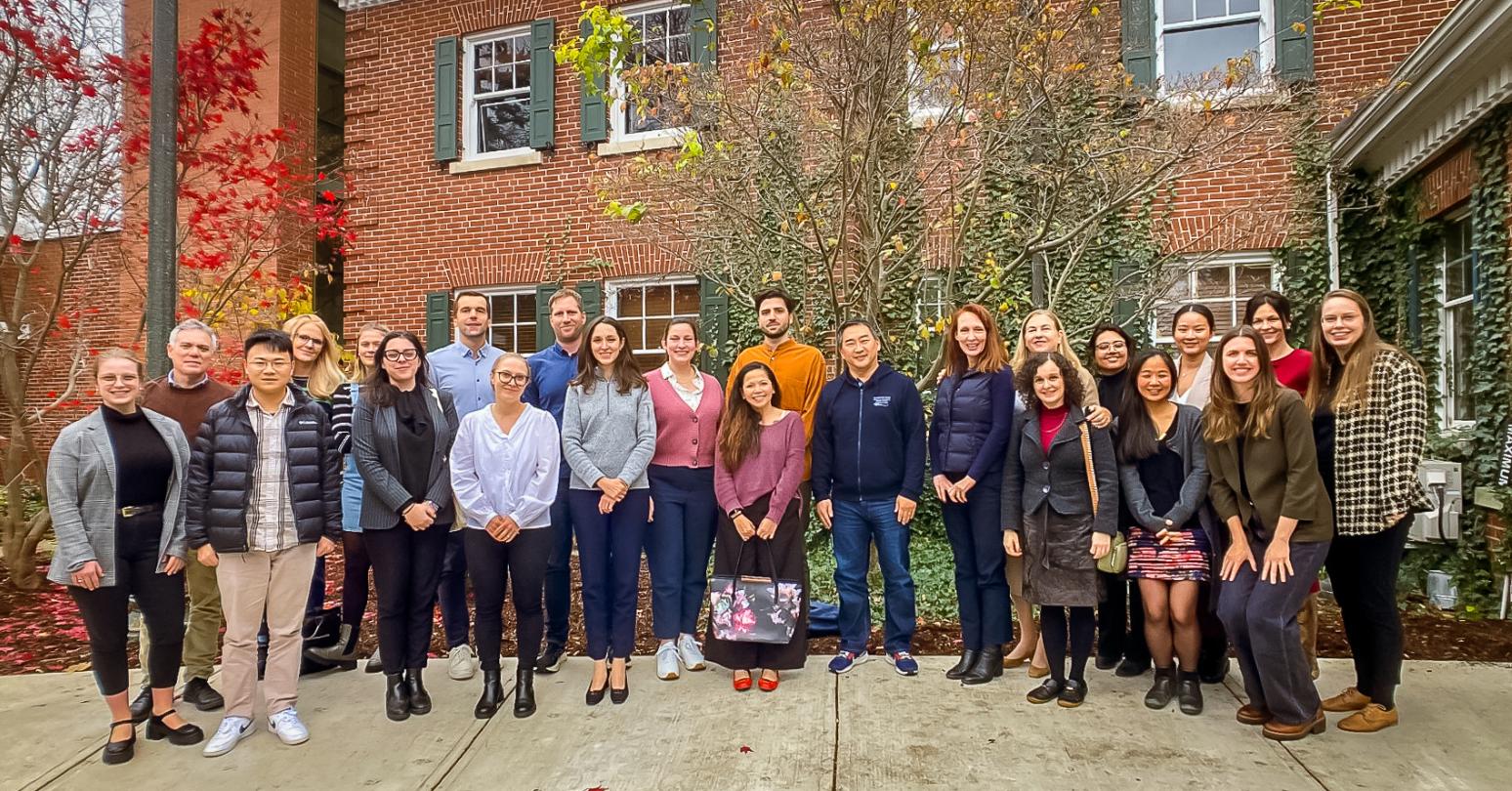
PhD Academy
The 17th Annual PhD Sustainability Academy, co-hosted by the Ivey Business School and the Alliance for Research on Corporate Sustainability (ARCS), convened 16 promising PhD students and 8 senior researchers representing universities from 8 different countries.
The purpose of the event is to champion path-breaking research on sustainability across disciplines and to provide intensive feedback to students. The PhD Academy is organized and hosted by Professor Oana Branzei.
Research awards and recognitions
Our faculty are doing ground-breaking research in sustainability and are recognized globally for their work and achievements.
Sustainability publications
List of all Ivey sustainability-related publications in 2024 here.
LEADERSHIP PROGRAMMING
LEADERSHIP
PROGRAMMING
LEADERSHIP
PROGRAMMING
HBA Sustainability Certificate
The HBA Sustainability Certificate equips Ivey HBA students with the skills and mindset to build and lead sustainable organizations, preparing them to become responsible C-suite decision-makers, entrepreneurs, nonprofit leaders, and policymakers.
In 2024, the program welcomed 81 students who focused on defining their professional and personal purpose through the "The Future We Make” challenge. This hands-on experience helped them navigate the trade-offs in sustainability decisions while exploring how AI and technology can accelerate progress.
Through a series of events, students engaged with guest speakers from organizations such as Microsoft, The Do Good Only Company, Terra Optima, Lifegiver Box, BIOSCAN, Zentein, tentree & veritree, SINGLA, Style With Substance Ventures, BE Ultimate Apparel, and more. They also benefited from mentorship from Ivey alumni who are driving change in sustainability.
From 2023 to 2025, Professor Diane-Laure Arjaliès joins Professor Oana Branzei as program co-director. A leading voice in sustainable finance, Professor Arjaliès brings deep expertise and a commitment to advancing knowledge and practice in the field. As head of Ivey's Sustainable Finance Lab, she explores innovative approaches and collective action strategies to transform financial markets toward sustainability.
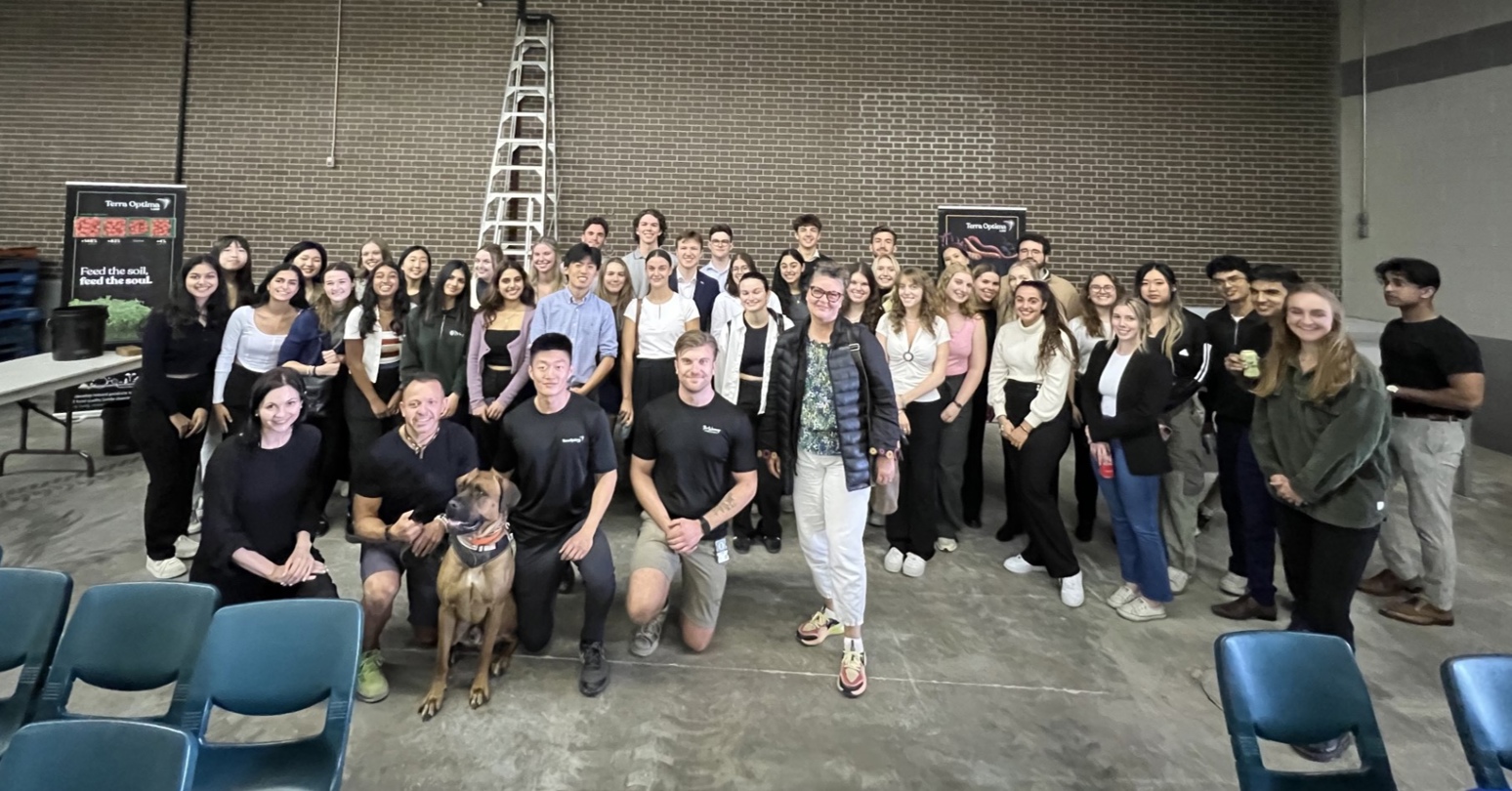
HBA students visiting the TerraOptima Labs headquarters
MSc Graduate Diploma in Business and Sustainability
In 2024, Ivey welcomed the second cohort of the Graduate Diploma (GDip) in Business and Sustainability, a program designed to equip future leaders with the skills and knowledge to navigate today’s evolving sustainability challenges. Offered in collaboration with Ivey’s MSc in Management program and the Centre for Building Sustainable Value, the diploma integrates sustainability into core business strategy, preparing graduates to address environmental, social, and economic issues with a systems-thinking approach.
Employer demand for sustainability expertise continues to grow - Deloitte reports that nearly 70% of major Canadian financial institutions face skills shortages in sustainable finance and business sustainability. Ivey’s GDip graduates help fill this gap, combining a globally recognized business education with deep sustainability knowledge and practical skills.
This year, the program also introduced two new fellowships: the Regeneration-in-Action Fellowship and the ESG-in-Action Fellowship, supporting students committed to driving meaningful change in the business and sustainability landscape.
Inaugural Worldchangers Award
In March 2024, Derrick Emsley, HBA '12, received the inaugural Ivey Worldchangers Award, recognizing alumni who drive meaningful global impact. Emsley was honored for his leadership in environmental sustainability, including co-founding Tentree, a brand that has planted over 100 million trees, and Veritree, a platform enhancing reforestation transparency. The award celebrates his commitment to innovative, scalable solutions that address climate challenges while inspiring future generations of business leaders.
HBA Social Impact Conference
Ivey's sixth annual Social Impact Conference 'Bloom' took place in January 2024. This student-run event aimed to equip participants with the tools, knowledge, and resources to foster a sustainable future. Keynote speakers included Nura Taef (Partner in ESG Reporting at Deloitte) and Steven Bethell (Co-founder of Bank & Vogue). The conference also featured a panel discussion titled "ESG is Everywhere," with panellists such as Katie Yao, HBA ’21 (Consultant at Boston Consulting Group), Andrea Vandenburg (Climate Change and Sustainability Services Manager at EY Canada), and Alex Levine (Principal of Accounting Standards and Sustainability Reporting at the Accounting Standards Board). Additionally, workshops covered diverse topics, including Social Capitalism, Entrepreneurship and Painting, Degrowth vs. Green Growth, and Responsible Investing.
OUTREACH AND COMMUNITY BUILDING
OUTREACH AND COMMUNITY BUILDING
OUTREACH AND COMMUNITY BUILDING
Ivey Sustainability Alumni Community - Global Ivey Day
During Global Ivey Day 2024, Ivey alumni leaders from various industries convened to explore the evolving landscape of corporate sustainability. The discussion highlighted the challenges and opportunities businesses face in embedding sustainability into their strategies.
The panel featured:
- Tom Ewart, HBA ’04, AVP of Sustainability at Co-operators Group, who shared insights on integrating sustainability across corporate operations, emphasizing transparency and proactive measures.
- Anushka Grant, MBA ’05, Vice President of Operational Excellence and Sustainability at Oxford Properties Group, who underscored the importance of comprehensive action on climate change and proactive stakeholder engagement.
- Teanne von der Porten, MBA ’05, Executive Director of ESG Services at KPMG, who highlighted the early stages many companies are in regarding sustainability and the need for clear roadmaps and operational models.
The session underscored the importance of cross-sector collaboration and innovative thinking in advancing sustainability goals.
Alumni Leadership
Our alumni are at the frontlines of leading the shifts towards a more sustainable future. Learn about how alumni are making an impact.
Network for Business Sustainability (NBS)
The Network for Business Sustainability (NBS) is a non-profit advancing sustainable development to build a fairer and more environmentally sound future. As the international outreach arm of BSV, we work together as a coordinated team.
NBS aims to improve business practice by facilitating knowledge sharing across an international community of business leaders, scholars, students and policy makers. With these stakeholders, we co-create high-quality content that enables practical action.
Highlights from 2024 include:
- Convening 5 virtual workshops to help business educators bake climate change into their teaching. The workshops drew more than 450 registrants, 20 presenters, and 7 partner organizations.
- Organizing 6 virtual knowledge exchanges, where the leaders of sustainability research centres from around the world could network and share best practices.
- Published 26 sustainability knowledge resources in six core areas: Sustainable Innovation, Climate Change, Circular Economy, Sustainable Finance, Social Justice, and Sustainability in Business Education. NBS content was viewed more than 160,000 times.
- Ran a strategic review process to shape our activities in 2025 and beyond!
NBS Article Highlights:
ADVISORY COUNCIL
ADVISORY COUNCIL
ADVISORY COUNCIL
Advisory Council Spotlight
Our Advisory Council provides advice and inspiration to the Centre’s Directors and Faculty with the aim of deepening and expanding the Centre’s impact and reach. It is composed of forward-thinking leaders from business, government, and not-for-profit organizations.
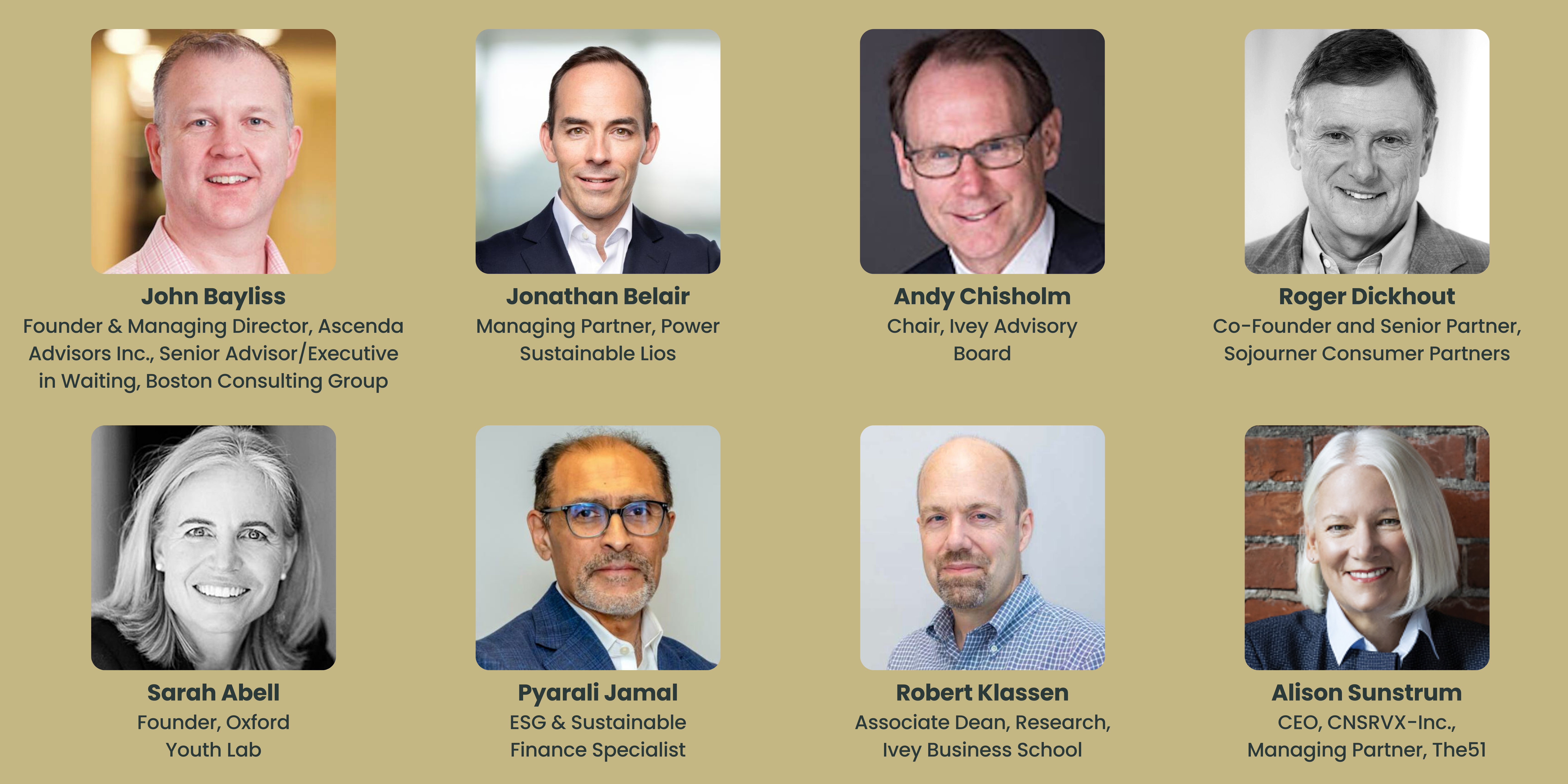
Sponsor & Partner Recognition
Funders Recognition
Foundations & Not-for-Profits:
- Beryl M. Ivey Fund for Corporate Social Responsibility
- Chisholm Thompson Family Foundation
- CPA Canada
- McConnell Foundation
- RBC Foundation
Government:
- Environmental & Climate Change Canada (ECCC)
- Innovation, Science and Economic Development Canada (ISED)
- Great Lakes St. Lawrence Governors & Premiers (GSGP)
- Middlesex-London Food Policy Council
- Mitacs
- National Research Council of Canada
- Natural Resources Canada Social
- Sciences and Humanities Research Council
Partners Recognition
Corporate:
- 3M
- Bell
- Cisco
- Co-operators Group
- CPA Canada
- Georgian Partners
- IKEA
- Interac
- JLL Canada
- Maple Leaf Foods
- Mattamy Homes
- Next Generation Manufacturing (NGen)
- Ontario Teachers’ Pension Plan
- RBC
- SAP
- Suncor
- TechAlliance
- Triovest
- Vale
- Walmart Canada
Academic:
- L’Université du Québec à Montréal
- University of Alberta





